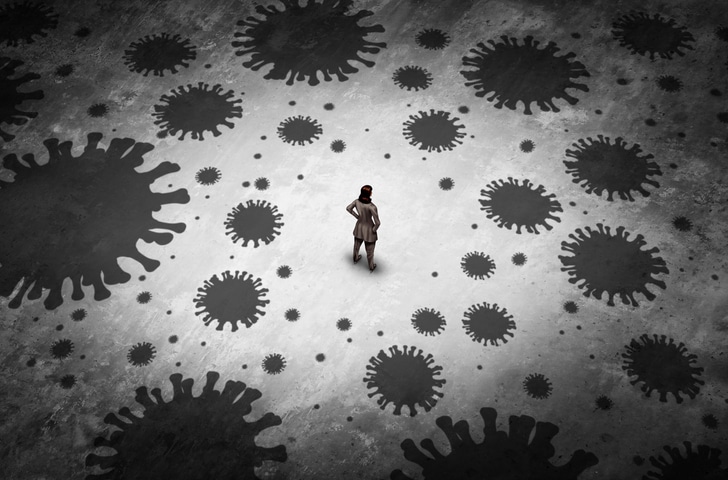Starting Treatment During Covid-19
The United States is currently in the midst of one of the worst public health crises in decades. As the COVID-19 virus spreads, many people are wondering if it is safe to enter a treatment facility. Consider the following information to help decide if treatment is right for you.
The COVID-19 Pandemic
COVID-19 is a mild or atypical virus that targets the respiratory system. It spreads through droplets and particles in the air. Individuals with underlying medical issues may experience more complications.
With the Delta variant of COVID-19 spreading aggressively, there is an urgent need for Americans to get vaccinated. The public can receive approved vaccines at no cost to build immunity and decrease the likelihood of catching COVID-19 or requiring hospitalization if they do get sick. The Center for Disease Prevention and Control (CDC) states, “as of October 12, 2021, more than 187 million people in the United States had been fully vaccinated against COVID-19.”
As a result of the increase in Delta variant cases, the CDC has resumed and updated its recommendations to slow down the spread of the virus. Accordingly, the CDC declared the following guidelines:
- Wear face masks in public and crowded locations. Masks should cover the nose and mouth entirely.
- Get tested if you experience symptoms of the COVID-19.
- If exposed to COVID-19, quickly get tested and monitor yourself for any symptoms.
How Has COVID-19 Impacted Addiction?
According to the CDC, COVID-19 poses many threats to people in recovery and those still struggling with a substance use disorder (SUD). They risk catching COVID-19 and suffering from severe complications as a result.
People suffering from SUD have found the necessary isolation during COVID-19 extremely challenging. Recent studies revealed a significant rise in binge drinking and overdoses during the lockdown. Many individuals with SUD found themselves at home with limited peer support for their recovery. As with the many others in the country, they faced job losses, familial upheavals, financial insecurity, and limited access to their healthcare provider and prescriptions. As a result, their physical and mental health suffered as they tried to juggle both their SUD and the realities of COVID-19 sweeping the nation.
Impacts on Mental Health
When the COVID-19 pandemic hit, those with mental health issues experienced higher levels of stress and anxiety and now they’re at risk of their mental health issues worsening. Before these uncertain times, researchers documented the relationship between SUD and mental health disorders. According to the U.S. National Library of Medicine, about half of people with a mental disorder have a dual diagnosis that includes a SUD.
Mental health conditions and substance abuse have worsened in the aftermath of COVID-19. With the interruption of treatment services, many have found themselves struggling to find help for their addiction. Consequently, many people have resorted to substance use to cope. Unfortunately, this situation may only worsen their feelings of fear, guilt, and exhaustion. That’s why it’s important to seek treatment, regardless of COVID-19. At Restoration Recovery, we want to help you through this time.
Impacts on Physical Health
The use of alcohol and illicit drugs can cause harm to the immune system and vital organs like the heart and lungs. If individuals catch COVID-19, it can cause even further damage to their vital organs and place their life at risk. For this reason, individuals still struggling with alcoholism or SUD should consider entering treatment. It will help their overall health if they can recover during this period.
Choosing to Enter Treatment
Drug rehabilitation facilities provide a safe, healthy environment that addresses the underlying issues leading to addiction and teaches coping mechanisms to prevent relapse. Additionally, many treatment centers provide medically assisted treatment or medical detoxes that help you detox safely with medical supervision. Detoxing on your own is not recommended because of the many health risks of withdrawal symptoms.
Rehabilitation facilities are taking the necessary safety precautions, lowering your risk of catching COVID-19 during treatment. To prevent COVID-19 from spreading, facilities are regularly testing patients and their teams. Moreover, outpatient treatment programs continue to comply with social-distancing guidelines. Lastly, rehab centers are ensuring they have enough personal protection equipment (PPE), disinfecting wipes, hand sanitizers, masks, and gloves. At Restoration Recovery Center, we are ready to treat you safely in these uncertain times.
How Restoration Recovery Center Can Help
At Restoration Recovery, we offer a residential treatment program, PHP/Day program, and outpatient treatment. With such a variety of choices, you can find the best treatment program that fits your situation during these uncertain times. Since our center lies beneath the foothills of the Sierra Nevada mountains, you can escape and de-stress from the chaos of life to enjoy the beauty of nature. Our team of clinicians offers a variety of therapies to unpack and treat your SUD, trauma, triggers, etc. You don’t have to go at this alone; we are here to help. As the COVID-19 pandemic continues, we take this threat very seriously. We’ve implemented safety protocols to keep our clients and staff safe from this virus.
Addiction doesn’t take a break for anything, not even a global pandemic. If anything, substance use disorders are on the rise during this COVID-19 crisis. More and more people find themselves struggling in isolation and experiencing stressful situations. As a result, the country is facing an unprecedented surge in drug overdose deaths. In addition, individuals with SUD are struggling with their mental and physical health because of the threatening nature of COVID-19. At Recovery Restoration Center, we offer a high level of protection from the virus while in our care. Our team of expert clinicians helps people with a SUD learn new coping skills to manage their disease. Therapeutic services include trauma-based therapy, CBT, DBT, holistic options, and more. We take the welfare of our patients and staff very seriously. If you or someone you love is trying to overcome an addiction, don’t hesitate to contact us for help at (888) 290-0925.






